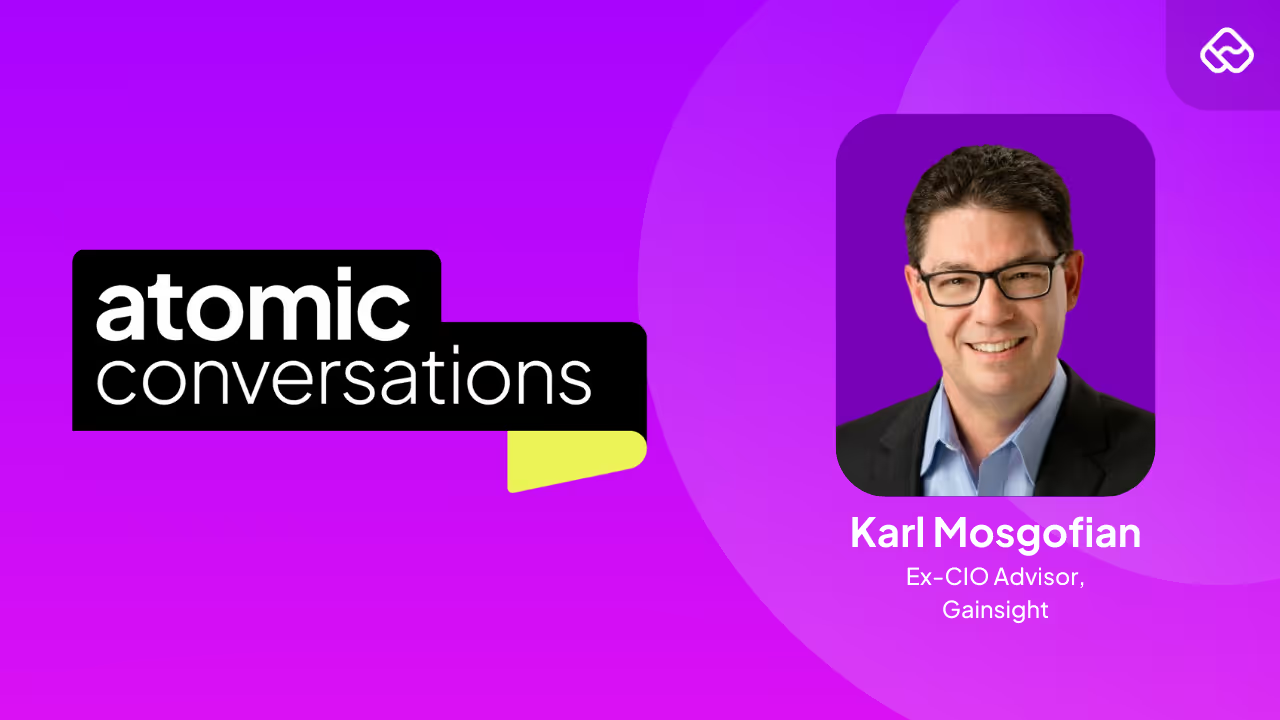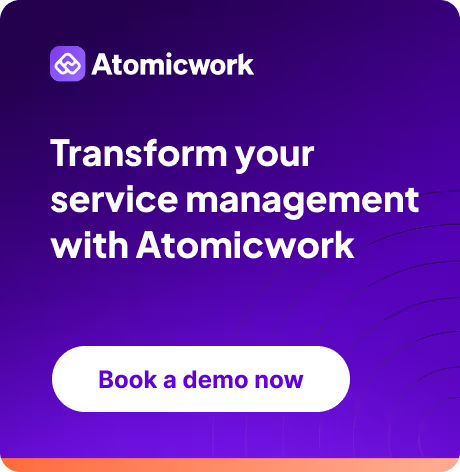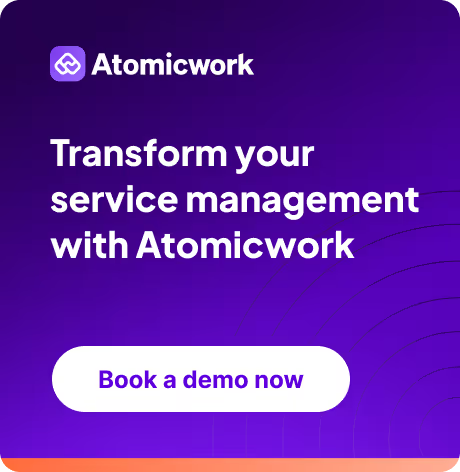Baseball cards, databases, and boardrooms: Insights from Karl Mosgofian

“I was a particular kind of nerd... I was the kind of kid who wanted to keep track of my baseball cards in a database. But it turns out that's a very good kind of nerd to be if you want to get a great job.”
In our latest episode of Atomic Conversations, Lenin Gali, Chief Business Officer at Atomicwork, sat down with Karl Mosgofian, former CIO at Gainsight, to explore his journey from teenage computer enthusiast to IT leadership and beyond.
With more than three decades of experience navigating technological transformations, Karl offers a unique perspective on the evolving role of IT and the impact of AI on service management.
Karl is now focusing on advisory roles with growing companies, helping them navigate the intersection of technology and business while building bridges between founders and CIOs. His evolution from ‘database nerd’ to strategic advisor offers valuable insights for both technology leaders and startups.
Watch the entire conversation here or grab the highlights in this article.
From organizing baseball cards to building IT architecture
Karl’s journey into IT began with an early passion for organization and databases.
This early curiosity led him to start a consulting company at a young age, where he learned by working directly with business stakeholders to solve real problems.
It’s always bridging the gap between the business needs and the technology solutions, and that never changes... it was the same when it was writing database applications, when it was writing web applications, and now with AI. It’s just a new tool in our toolbox to solve business problems with. - Karl Mosgofian, Ex-CIO of Gainsight
Karl’s self-identification as a database enthusiast reveals an often-overlooked path to IT leadership. His childhood hobby organizing baseball cards wasn’t just a quirky interest but demonstrated an intuitive understanding of information architecture that would serve him throughout his career.
As he puts it, those who are “fascinated by how things work” and have a mind that “appreciates complex systems” often excel at understanding “how all the different pieces of the business tie together and therefore how the systems need to tie together.”
The switch from being an ‘operator’ to driving strategic influence
One of Karl’s most insightful observations was about career progression. Rather than seeing his career as a ladder with continuous upward mobility, he embraced a more fluid approach. “Sometimes people get caught up in this idea that ‘I had 100 people and then I need to have 200 and then I need 500’... that it has to be a sort of linear progression".
One of the things that we’ve talked about at Gainsight in the past is this idea of not a ladder but a jungle gym. So, you may be moving up, but you're not moving in a linear straight line, and I think it's a brilliant concept.
Karl challenges conventional career wisdom when describing his transition from operational leadership to enterprise architecture: “I've kind of gone back and forth between the operational and the pure strategic, and I think it's really good. It keeps you fresh. It keeps you sharp.”
He also noted that some personalities are better suited for breadth rather than depth, “If you want to go deep, be an engineer and choose an area and be an expert on it. But if you have the kind of personality that you like to know everything, IT is actually a great place to be, especially if you have a mind that appreciates complex systems.”
Karl’s take on AI’s impact on enterprises
Karl offered a compelling perspective on how AI is transforming IT operations and service management. “We’ve had chatbots for a long time, but chatbots were never very good because they were rule-based,” he noted, highlighting the fundamental shift that large language models (LLMs) represent.
In specific, Karl notes that AI can help:
- Break through automation barriers: Traditional rule-based automation has hit a wall because business processes have “more exceptions than rules”. Where previous automation required exact rules, AI-based workflows can adapt to variations and exceptions. Modern AI can, in fact, directly take actions and solve problems (like unlocking accounts) rather than just pointing to resources.
- Enable 24/7 enhanced service while reducing agent workload: AI delivers always-available support that’s more interactive and capable than traditional help systems. AI thus frees IT staff from repetitive L1 tasks to focus on “more interesting project work.”
- Improve user experience: AI can now navigate unfamiliar interfaces without explicit instructions, representing what Karl calls “a revolutionary leap.” Unlike previous technologies, LLMs can interpret “fuzzy” instructions without requiring exact specifications. This means users receive more consistent, intuitive, and faster support without navigating complicated menus or using precise terminology.
Karl sees AI as beneficial for everyone involved, transforming service delivery while elevating the work of IT professionals.
A word of advice for startups selling to CIOs
In his new advisory role, Karl plans to help startups better navigate the CIO purchasing process. “The practitioner that you’re selling to is solving their technical problem,” he explains. “That request then goes up the chain to a CIO, to a CFO, to a CEO, maybe, and at that point it's not a technical decision anymore. It's an investment decision.”
To navigate a CIO’s mindset and outcomes, Karl shares certain key insights - especially for startups.
- Understand the decision chain: Recognize that selling to a technical practitioner is just the first step; their request then moves up to executives who evaluate it as an investment.
- Help your champions sell internally: Provide materials and coaching that help your technical champions make the business case to their CIO.
- Address the investment perspective: Frame your solution in terms of business value rather than just technical capabilities when it reaches executive levels.
- Support the full approval path: Assist your champion in preparing for “the sell up the chain” to the CFO and CEO if necessary.
Karl also challenges the traditional adversarial approach to vendor relationships and advocates viewing vendors as strategic partners.
Our vendors have this great opportunity to see lots of different companies. So, you have this visibility and this understanding that I can never have because I don't see that. I'm inside my company, and so you can bring me best practices that I could never figure out on my own.
For more insights from Karl Mosgofian on the evolving role of IT, the transformative potential of AI, and building successful relationships between vendors and CIOs, watch the full conversation.
You may also like...

































